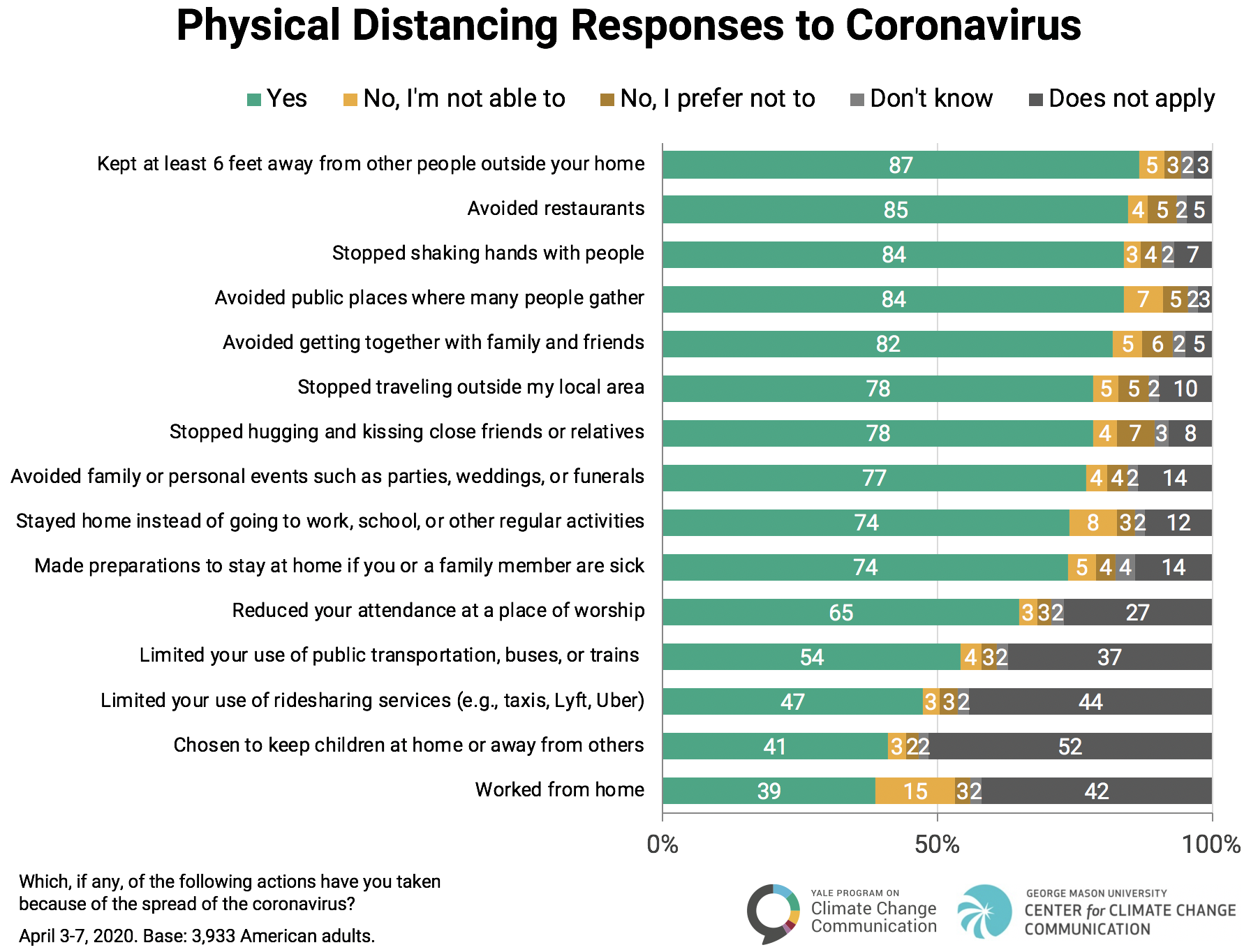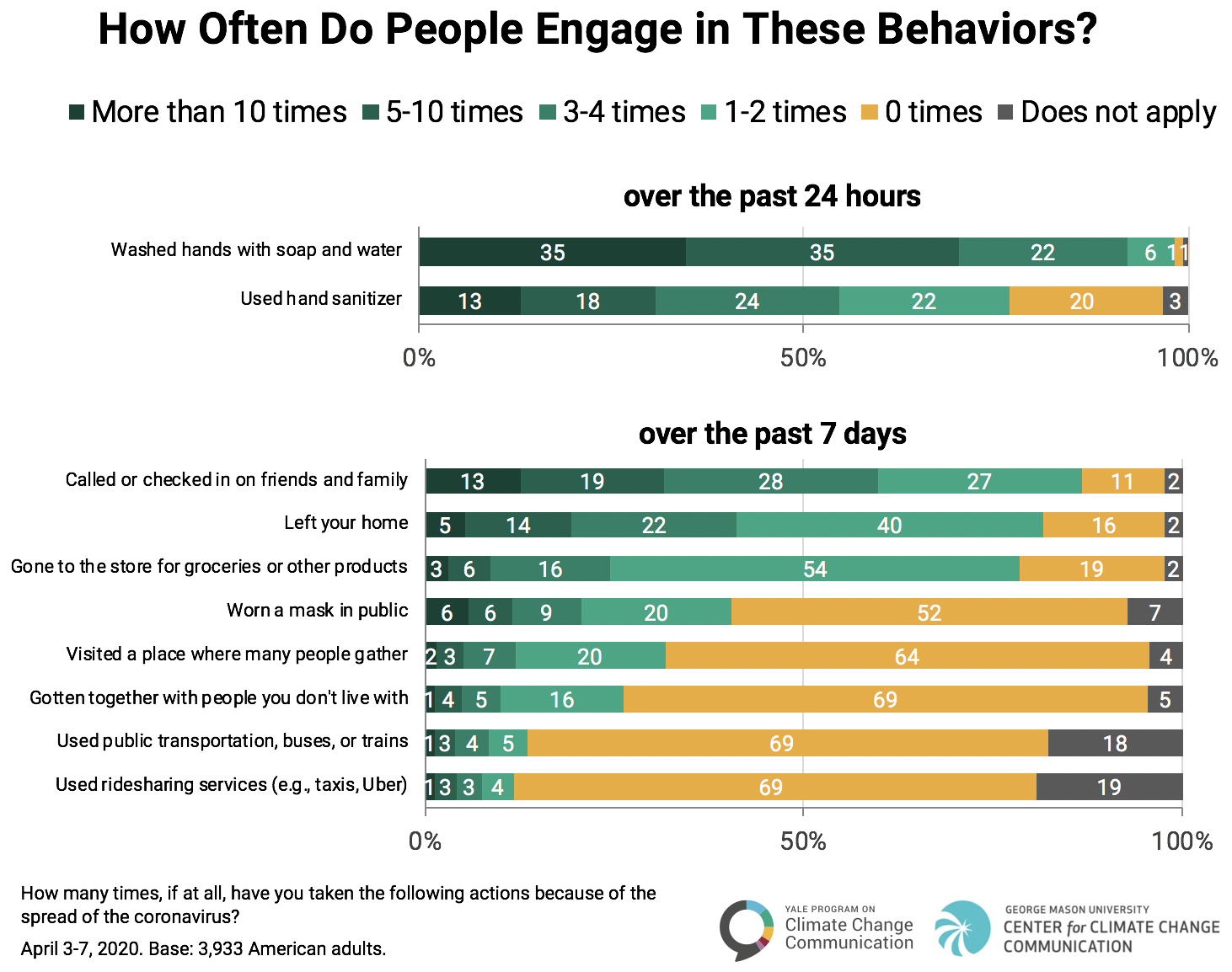Report · Apr 17, 2020
American Public Responses to COVID-19 – April 2020
By Matthew Ballew, Parrish Bergquist, Matthew Goldberg, Abel Gustafson, John Kotcher, Jennifer Marlon, Seth Rosenthal, Edward Maibach and Anthony Leiserowitz
Filed under: Messaging
4. Behavioral Responses
4.1. Behavioral responses to coronavirus.
A majority of Americans have adopted numerous protective behaviors recommended by the U.S. Centers for Disease Control (CDC) to prevent the spread of the coronavirus, and very few say they prefer not to or that they are not able to engage in these behaviors. Eight in ten or more Americans say they have increased the frequency of hygienic behaviors, including washing hands with soap and water (90%), cleaning or disinfecting their home or workspace (84%), and covering their mouth/nose with a tissue when coughing/sneezing (82%).
More than four in ten Americans (44%) say they have worn a mask in public to help protect themselves or others from getting sick and 39% say they have bought protective masks.The U.S. Centers for Disease Control and Prevention (CDC) announced new recommendations that all Americans wear face masks on April 3, 2020. This recommendation was announced while the survey was being fielded.
A large majority of Americans (84%) are calling or checking in on friends, family, or neighbors because of the spread of the coronavirus. Seven in ten Americans (70%) say they have stocked up on items such as food, supplies, or medications, and 10% say they have purchased a gun and/or ammunition because of the spread of the coronavirus. Fifteen percent say they have sought mental health counseling.
4.2. Physical distancing responses to coronavirus.
Majorities of Americans have engaged in physical or “social distancing” because of the spread of the coronavirus, and very few say they prefer not to or that they are not able to. Nearly nine in ten Americans (87%) say they have kept at least 6 feet away from other people outside their home. Eight in ten or more Americans say they have avoided restaurants (85%), stopped shaking hands with others (84%), avoided public places where many people gather (84%), and avoided getting together with family and friends (82%). About three in four or more Americans have stopped traveling outside their local area (78%), stopped hugging and kissing close friends or relatives (78%), avoided family or personal events (77%), stayed at home instead of going to work, school, or other regular activities (74%), and made preparations to stay at home if they or a family member gets sick (74%).
About two in three Americans (65%) have reduced their attendance at a place of worship. Many Americans say they have also limited their use of public transportation (54%) and use of ridesharing services (47%). Many have also chosen to keep their children at home or away from others (41%). About four in ten Americans (39%) say they have worked at home, while 15% say they are not able to.
Although the majority of younger Americans (18-29) are taking protective actions, they are relatively less likely to be taking protective measures than other adults, are less likely to say their own friends and family are taking protective measures, and perceive less social pressure from their friends and families to take action to limit the spread of coronavirus (see Appendix II: Data Tables). For example, younger Americans are relatively less likely to have:
- Stopped hugging and kissing close friends or relatives
- Stopped shaking hands with others
- Kept at least 6 feet away from other people outside their home
- Avoided getting together with family and friends
- Called and checked in on friends, family, or neighbors
- Reduced their attendance at church, temple, mosque, or other place of worship
While younger generations are at less risk for serious illness or death from COVID-19,https://www.cdc.gov/coronavirus/2019-ncov/need-extra-precautions/people-at-higher-risk.html their actions also influence the spread the coronavirus in the U.S.
4.3. How often do people engage in behaviors?
Many Americans are frequently washing their hands and using hand sanitizer. About one in three Americans (35%) say they have washed their hands with soap and water more than 10 times in the last 24 hours, with an additional 35% saying they have done so 5 to 10 times. About one in eight (13%) say they have used hand sanitizer more than 10 times in the last 24 hours, with an additional 18% saying they have done so 5 to 10 times.
Americans are frequently calling or checking in on their friends and family. About one in eight (13%) say they have done so more than 10 times in the last week, with an additional 19% saying they have done so 5 to 10 times. Many Americans say they are rarely leaving home. Four in ten Americans (40%) say they left their home only 1 to 2 times in the last week, and over half (54%) say they went to the store for groceries or other products.
About four in ten Americans say they wore a face mask in public 1 to 2 times or more often in the last week.The U.S. Centers for Disease Control and Prevention (CDC) announced new recommendations that all Americans wear face masks on April 3, 2020. This recommendation was announced while the survey was being fielded. More than six in ten Americans say in the last week they have not used ridesharing services (e.g., taxis, Uber) (69%) or public transportation, buses, or trains (69%), gotten together with people they don’t live with (69%), or visited a place where many people gather (64%).


